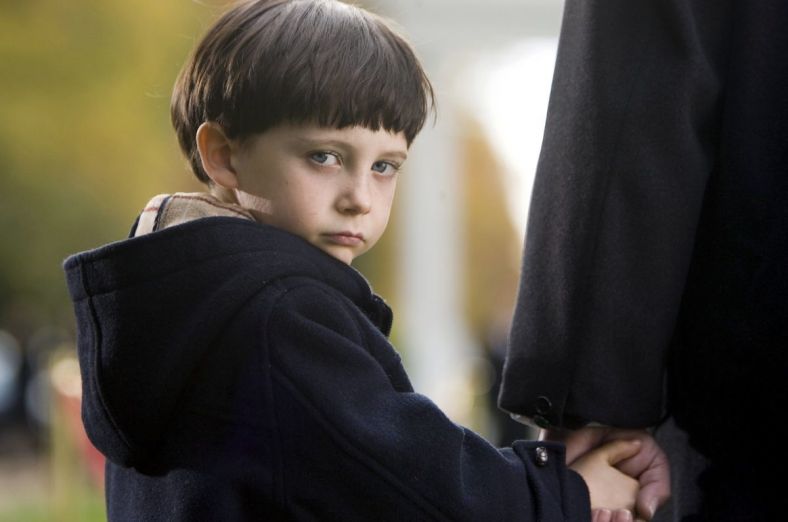‘The Omen’ Remake Is Better Than You Remember

When John Moore’s remake of The Omen hit theaters on June 6, 2006, it’s like it came with the blessing of the Antichrist himself. A movie about the Devil’s son released on 6/6/06 was a genius marketing stunt (and, unlike Late Night With the Devil’s $666,666 in ticket sales, a real thing). Theologically, 666 doesn’t amount to much for anyone but the most ardent apocalyptic Christians—and there remains an ongoing debate about whether the alleged “Mark of the Beast” has even been interpreted correctly—though in the modern zeitgeist, 666 is as frightening a way as any to signal the Devil. So, a remake of The Omen released on such a beguilingly unholy day was enough to spur audience interest and generate a $120 million box office haul. It wasn’t, however, enough to win over critics.
Moore’s The Omen, like Gus Van Sant’s Psycho or Kimberly Peirce’s Carrie, was a remake in the strictest sense. While it wasn’t quite shot-for-shot like the former, it did, like the latter, amount to the same story, the same beats, digitally glossed up for a new age. Like all horror remakes, it bore not just the Mark of the Beast, but the worst impulses of the horror remake scene in the early aughts. Broad audience attitudes have mellowed since, though at the time, there were regular grievances lobbed toward the studio horror system and its alleged insistence on releasing nothing but shallow remakes of much better movies. For me, The Omen is different. I liked it.
Also Read: ‘The First Omen’ Review: The Perfect Religious Horror Film
In fairness, my reaction to The Omen might well be different had I seen Richard Donner’s original first. Make no mistake; the two are, all points considered, the same movie. In a rare WGA arbitration decision, original screenwriter David Seltzer received sole credit for the remake’s screenplay despite having no involvement whatsoever. Dan McDermott, who wrote the script, remains uncredited.
Beat for beat, death for death, the two movies are the same. Moore does little to distinguish his remake from the original. Where the forthcoming The First Omen and several sequels to the original (my favorite of the entire series being Damien: Omen II) endeavored to iterate upon the formula, Moore’s remake is a dolled-up recreation. Eschewing even the mimicry as homage to Samuel Bayer’s A Nightmare on Elm Street remake (which I also liked), it’s just the same movie. Yet, that doesn’t necessarily render Moore’s The Omen a bad movie.
For audiences like myself—I was in fifth grade when the film was released—it was the first time being introduced to Seltzer’s world. His novelization of the original film remains one of the scariest books I’ve ever read. When the remake was released, I knew nothing of Gregory Peck and Lee Remick. I only knew about Liev Schrieber and Julia Stiles. They were both hot and the movie they were in went hard as Hell. Literally.
Also Read: ‘The First Omen’ Director Arkasha Stevenson On Tackling Religious Horror And Assault
There were jackals, gruesome Rube Goldberg-style deaths, and Mia Farrow hamming it up. I had, at that time, already seen Rosemary’s Baby, so that was really cool to me. Additionally, The Omen as a remake felt dangerous. Fifth graders have myopic perspectives, okay, and seeing this demonic movie on 6/6/06 (as a Sunday school kid, no less) was about the coolest thing I could have done. Yes, I was telling everyone about it after confession.
Where the remake succeeds has less to do with the grit of something like Marcus Nispel’s The Texas Chainsaw Massacre, one of the best horror remakes around. Where Nispel modernized, Moore harkened back. In broad terms, The Omen is too strong a source material to really go awry. Sure, for audiences who had seen the original, it no doubt begged the question as to why a remake of that nature needed to even exist at all. But for newer audiences, younger audiences, it was a gateway into one of the most bonkers horror series of all time.
In fact, I’d go further. By now, I’ve seen both several times, yet familiarity with the original has done little to dull the efficacy of the remake. They’re the same movie but not. One is more accessible, a bit more lustrous, and commercial. The other is a deeply troubling meditation on faith and evil, an introduction into a world where, per Seltzer’s intent, was guided by the evil, violent machinations of the Devil and his son.
Also Read: ‘The First Omen’ Star Nell Tiger Free On Going Feral [Watch]
It’s unproductive to weigh one against the other consistently. In 2006, outside hardcore horror hounds, it’s not like The Omen as a franchise yielded considerable cultural cache. Damien might have been popular—though, accounting for the short-lived series Damien, maybe not—but the series writ large remained in the shadow of The Exorcist and an early aughts inundation of faith-based horror.
Moore’s remake, while not terribly unlike the original, at least revitalized the series and directed audiences back to Donner’s original. A good scary story is a good scary story. Whether in 1976 or 2006, The Omen remains one of the most frightening religious horror movies of all time. Contemporaneous critics pointed to its fidelity as a shackle. Instead, I think it’s The Omen’s greatest strength. Whether it’s the first omen, the same omen, or the last omen makes no difference to me. No doubt, it’ll birth something remarkable.
Categorized:Editorials

